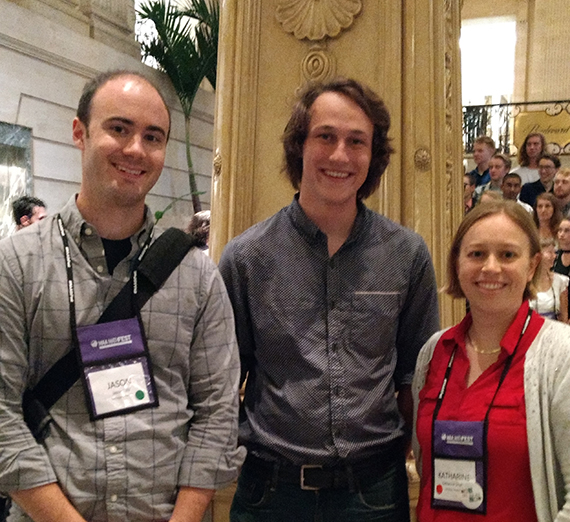Student Wins Best Student Research Talk at MathFest

Trent DeGiovanni (’18) is proof positive that hard work and a balanced set of skills—gained both in and outside of the classroom—lead to success.
After earning a travel grant to attend the 2017 MathFest (the largest mathematics conference in the U.S.), Trent went on to present his research and win the Council on Undergraduate Research Award for the best student research talk out of 76 student presenters.
Trent’s research focuses on the common dissection of polygons. He relates it to playing with tangrams as a kid: taking a polygon, cutting it up, and then using those pieces to form a different polygon. “This was the first idea that [my faculty advisors] Dr. Shultis and Dr. Lutz pitched to me; in my naïveté I thought it seemed relatively simple. It turns out there is a lot more depth and nuance in the question, which has made it really enjoyable.”
Trent credits the encouragement of his advisors for his participation in MathFest, and while his time on the Gonzaga debate team has contributed to his public speaking skills, “Talking about math is definitely a different ball game . . . I think [the award] does give me some validation of my ability to explain math, which I think is a skill a lot of mathematicians don’t worry about.”
Trent has an appreciation for the breadth of subjects he’s taken at Gonzaga as part of the university common core and even draws comparisons between the disciplines of Philosophy and Math: “Philosophy uses similar applications of logic to math, and being able to engage critically with ideas beyond numbers is an important skill. Having to carefully explain arguments . . . is something philosophy emphasizes, and it has made me a more intentional person.”
And what exactly attracts Trent to math? “Math is so exciting because it is challenging. Sometimes it can be frustrating, but when you begin to understand a problem it’s like waking up on Christmas morning.”
After earning a travel grant to attend the 2017 MathFest (the largest mathematics conference in the U.S.), Trent went on to present his research and win the Council on Undergraduate Research Award for the best student research talk out of 76 student presenters.
Trent’s research focuses on the common dissection of polygons. He relates it to playing with tangrams as a kid: taking a polygon, cutting it up, and then using those pieces to form a different polygon. “This was the first idea that [my faculty advisors] Dr. Shultis and Dr. Lutz pitched to me; in my naïveté I thought it seemed relatively simple. It turns out there is a lot more depth and nuance in the question, which has made it really enjoyable.”
Trent credits the encouragement of his advisors for his participation in MathFest, and while his time on the Gonzaga debate team has contributed to his public speaking skills, “Talking about math is definitely a different ball game . . . I think [the award] does give me some validation of my ability to explain math, which I think is a skill a lot of mathematicians don’t worry about.”
Trent has an appreciation for the breadth of subjects he’s taken at Gonzaga as part of the university common core and even draws comparisons between the disciplines of Philosophy and Math: “Philosophy uses similar applications of logic to math, and being able to engage critically with ideas beyond numbers is an important skill. Having to carefully explain arguments . . . is something philosophy emphasizes, and it has made me a more intentional person.”
And what exactly attracts Trent to math? “Math is so exciting because it is challenging. Sometimes it can be frustrating, but when you begin to understand a problem it’s like waking up on Christmas morning.”
